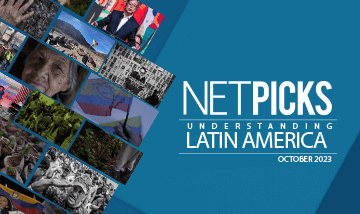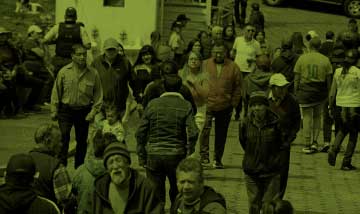Índice
Understanding Latin America
Dear readers and colleagues, this month we bring you five articles that reflect the reality of Latin America, one each from: Colombia, Brazil, Guatemala, Argentina, and Ecuador.
- In Government, but Not in Control
- ‘We defended our right to the land’: Brazil’s Indigenous people hail supreme court victory
- The Promise of Spring
- Indigenous women lead battle for land rights in Argentina
- Ecuador says no to extractive industries
.
IN GOVERNMENT, BUT NOT IN CONTROL
When Colombia’s first left-wing President Gustavo Petro was elected into office in 2022, he and his running mate, activist Francia Marquez, couldn’t have been a more radical shift in government. But it’s become clear over Petro’s past year in office that many of the fundamental social and democratic reforms the pair intended to implement are being blocked by key factions who hold sway in the country. This includes business associations who opposed their planned reforms to healthcare, pensions and labor laws, while the three most powerful business families own large media conglomerates that gives them the power to thwart any reform that goes against their interests. Petro also lost the support he once had in Congress with the Pacto Historico, an electoral alliance made up of 20 small parties, which broke apart at the beginning of the year. Though President Petro was able to take some progressive steps forward within his first few months in office, it’s questionable whether his administration can pass the remaining social and environmental reforms they had in mind by 2026. Can Petro’s administration overcome these forces working against them?
Raul Zelik, August 31, 2023
https://www.rosalux.de/en/news/id/50936/in-government-but-not-in-control
.
‘WE DEFENDED OUR RIGHT TO THE LAND’: BRAZIL’S INDIGENOUS PEOPLE HAIL SUPREME COURT VICTORY
Indigenous communities in Brazil celebrated a major legal victory in September, when the Supreme Court ruled against the highly controversial “time frame” regulation, known as the marco temporal in Portuguese. According to this regulation, Indigenous people had to prove they occupied or contested the territory they claimed before October 6, 1988, the day Brazil’s federal constitution came into force, or their territory wouldn’t be considered legitimate. This time limit was seen as unfair by campaigners, as many Indigenous people are nomadic or had been forcibly removed by miners or farmers from their territory. This “time limit” argument was used in several cases to kick Indigenous peoples off their land or diminish their territory for the sake of expanding agribusiness and creating national parks. This includes the 2009 case when the Santa Catarina state government evicted the Xokleng people from two conservation areas, claiming they were illegally occupying the land. The Xokleng appealed against the decision, which eventually made it up to the Supreme Court. The high court finally ruled against the regulation in September, setting an important legal precedent. This might not solve all land conflicts in Brazil, but could this be a sign of things to come for Indigenous rights in Brazil?
Schirlei Alves, September 25, 2023
https://www.theguardian.com/global-development/2023/sep/25/we-defended-our-right-to-the-land-brazils-indigenous-people-hail-supreme-court-victory
.
THE PROMISE OF SPRING
On August 20, Guatemalans watched and listened with anticipation as the elections results rolled in and Bernando Arevalo, progressive candidate for the Semilla party, took the lead. Many were elated with the news that a left-wing party will take power for the first time in decades, but the win was particularly significant for the elder generations who lived through the “Guatemala spring” in 1944, the 10-year democratic window between military dictatorships, and brought them back to a time of hope. It was Arevalo’s father, Juan Jose Arevalo, who inspired this movement as he was the first democratically elected president in 1945, after a popular uprising ousted the US-based dictator Jorge Ubico from power. Some analysts say it was the recollection of the Guatemalan spring – kept alive by a generation who guarded the memory through decades of war, genocide, corruption, and impunity – that helped lift Arévalo’s unlikely campaign to power last month. It wasn’t an easy win, as his opponent Sandra Torres represents the establishment and many of Guatemala’s top institutions tried their hardest to ensure that an anti-establishment, progressive candidate like Arevalo not win, including raiding his campaign office and trying to bar his party from politics. But Arevalo prevailed. How did Arevalo’s supporters help him overcome all odds and win the presidency? Will their expectations of a new Guatemala Spring be met?
Victor J. Blue, September 10, 2023
https://theintercept.com/2023/09/10/bernardo-arevalo-guatemala-election/
.
INDIGENOUS WOMEN LEAD BATTLE FOR LAND RIGHTS IN ARGENTINA
Indigenous women are at the forefront of protests in Argentina against recent legislation that tramples of their land and community rights, restricts protests and freedom of assembly, and hands power to mining companies keen to exploit their lithium-rich homelands. This string of protests began in the north-west province of Juyjuy, which borders Bolivia and Chile, and falls into the so-called “lithium triangle” region. It’s also 8% Indigenous, triple the country’s provincial average, who oppose the lithium extraction that demands vast amounts of water and damages ecosystems. In June, Jujuy’s governor Gerardo Morales pushed through reforms to the province’s constitution that allowed for the forced dispossession of Indigenous territories, restricted the right to strike and assemble, and criminalized roadblocks. Indigenous women – who are often silenced, mocked and marginalized in Argentina – were the first to appear on television denouncing the reforms and the repressive response, and numerous human rights violations by the Jujuy government. Many of these activists now have warrants out for their arrest. In June, they marched to Buenos Aires where they remain camped out in front of the Palace of Justice, home of the country’s Supreme Court, and march daily through the capital city. Who are the women behind these protests, and what can we expect from this movement?
Ana Fornaro & María Eugenia Ludueña, Sept 22, 2023
https://www.opendemocracy.net/en/5050/argentina-jujuy-province-indigenous-women-lithium-protests/
.
ECUADOR SAYS NO TO EXTRACTIVE INDUSTRIES
Ecuador’s recent elections were marked by a severe security crisis, but also the surprisingly results of two environmental referendums that reflect a desire by citizens to move away from extractive industries. On August 20, 68% of voters from the Metropolitan District of Quito voted in favor of maintaining biodiversity in the Andean Chocó and thus putting an end to new mining concessions. Meanwhile 59% of voters nationwide put an end to oil extraction in the ITT block of the Yasuní National Park, in the Ecuadorian Amazon. Both referendums were allowed after social movements worked hard to collect enough signatures and mobilize popular support for the environmental causes. In the case of Yasuní, environmentalists had been campaigning for nearly 10 years before the Constitutional Court finally allowed the referendum to take place. This article recounts the background of these referendums, their implications for democracy in the country, but also the difficulties that lie ahead in implementing them as the Ecuadorian government refuses to comply with their outcomes, saying it will be a problem for the next president to deal with. The next round of elections will take place October 15, where citizens will choose between the banana tycoon Daniel Noboa and the Correista loyalist Luisa Gonzalez. To further understand the current social and political dynamics in the country, read this analysis of the first round election results in August. Read this informative article for more detailed information about the two candidates that will face off in October.
Carolina Loza León, September 2023
https://www.rosalux.org.ec/ecuador-says-no-to-extractive-industries/




